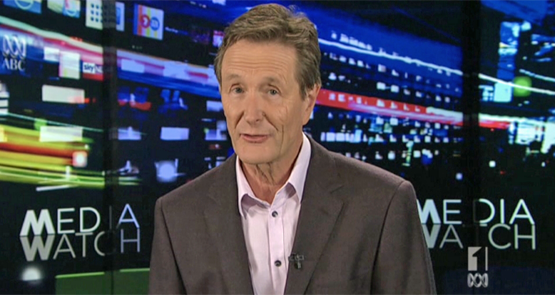Media Watch host Paul Barry has dismissed as “nonsense” any suggestions that the program he fronts could suffer the same fate as Q&A and be moved to the ABC’s News and Current Affairs division.
The ABC board moved Q&A, out of television and to the news division at its board meeting last week. High-level ABC sources claim the move was not precipitated by a letter from Prime Minister Tony Abbott to board chair Jim Spigelman demanding the ABC do so in the aftermath of the Zaky Mallah controversy.
Like Q&A, Media Watch is also the subject of frequent criticism for alleged bias. This has been the case for all its hosts, but current host Paul Barry recently wrote a book about the phone-hacking scandal in the UK, which the Australian News Corp papers argue demonstrates an “obsession” with News Corp, making him unsuitable to fairly sit in judgement over its journalism.
Writing in Crikey, former Media Watch executive producer David Salter argued last week that the enemies of the program have long been urging “accountability” that could, they argue, be achieved through a move to the news division. Salter wrote:
“That’s code for dumping the opinion standpoint of Media Watch and imposing, in its place, the same editorial standards and practices that apply to ABC news and current affairs output. If the board surrenders on Q&A … Paul Barry and his team should be worried.”
Today’s Australian takes up this theme, claiming in its Media Diary column that “at least one ABC board member has serious misgivings about the program’s direction under presenter Paul Barry”.
But speaking this morning, Barry dismissed suggestions the program could be moved. “I don’t believe there is any pressure whatsoever. My inquiries have led me to believe there is no pressure whatsoever,” he said.
The major issue with moving Media Watch to the News and Current Affairs division, Barry added, was that it would leave the program occasionally asking questions of its own editorial superiors. “It’d be like the police criticising the police. Imagine our management was news management, and we said their stories were rubbish.
“At the moment we’re independent — and are recognised as independent. There’s no pressure to change that. We’re explicitly given the role of criticising all media.”
Media Watch has in the past raised controversy over whether it is a journalistic program required to give all sides a say, or a program of media criticism and opinion.
Correction: Q&A previously sat in the television division, not the entertainment division, of the ABC. The piece above has been corrected.









Haven’t you done enough damage with the Q&A decision, ABC Board?
Leave Media Watch alone!
Myriam, for a media reporter, it would be handy if you could get the facts right. You continually write the Q&A (and Media Watch) were in the ABC’s Entertainment Department. This is wrong. Both programmes were part of the Television Division, under Richard Finlayson, and stand, like TV Documentaries and Factual, quite separate from entertainment which is also within the TV Division, but very much not in charge of these factual and opinion programs. Can you get this right next time please? It’s a very important distinction.
Hi Roger. Thanks for the tip – definitely worth getting that right. The ABC’s recent statements don’t say what division it was in originally and reports in other publications have written entertainment (not offering this to excuse error, just to explain how I made it). Having looked into this just now you’re right – I’ll let my editors know.
Writing a book about Murdoch’s Jack the Ripper tactics in the UK so clearly disqualifies Barry from even looking at, let alone commenting on Murdoch’s Jack the Ripper tactics in Australia.
Like Q&A, Media Watch is also the subject of frequent criticism for alleged bias.
Accusations of bias are frequent. Actual demonstrations of same, all but nonexistent.